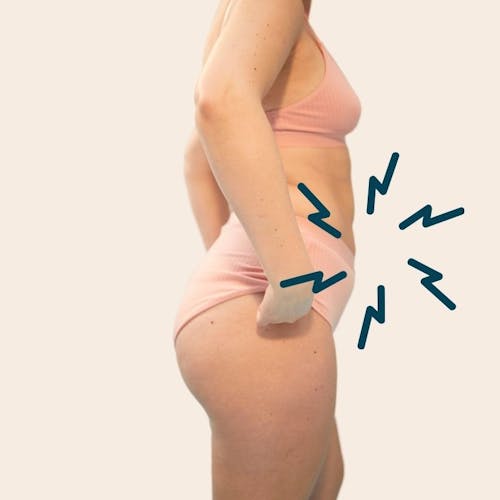This website uses cookies to enhance the user experience. By using Yoppie you are agreeing to our use of cookies.
Living With Endometriosis Leg Pain
Written by Yoppie
17 Dec 2021
What are the usual endo symptoms?
Is it endometriosis leg pain common?
What causes endometriosis leg pain?
What does endometriosis leg pain feel like?
Is endo leg pain serious?
What can I do about it?
People with endometriosis will know that the symptoms can be plentiful. From extreme stomach pains to heavy periods to fertility issues, and what might seem to be the strangest of all… leg pain? Here’s why you may experience aches and pains down your legs, and how to manage it day to day. Legs go!
What are the usual endo symptoms?
As many as 1 in 10 UK people with periods of reproductive age suffer from endometriosis, and the symptoms can be anything from pain in the lower belly or back, pelvic pain, intense period pain, pain during or after sex, or when peeing or pooing while on your period, nausea, constipation, diarrhoea, fertility issues… and yes, leg pain. You may experience only a few of these symptoms, or many, and they could be mild or severe. Sometimes endo symptoms can have a drastically negative effect on daily life, so it’s important to understand the condition and seek help when needed.
Is it endometriosis leg pain common?
Endo-related leg pain is more common than was once thought. Endometriosis.net suggests that around 40% or more of all people with endometriosis get some sort of leg pain, while a 2016 study reports that as many as 50% of endo sufferers could experience it.
What causes endometriosis leg pain?
You wouldn’t think a problem in your abdomen could create issues in your legs, but the body is so cleverly connected that sometimes seemingly unrelated issues stem from the same place. To recap, endometriosis is when tissue similar to the sort that grows in your uterus ends up growing in places it’s not supposed to, like your ovaries or fallopian tubes. Because it behaves in the same way as the tissue in your uterus, it swells up during your period, and breaks down and bleeds when it’s over, but has no way of leaving the body. Hence the sometimes intense pain and other symptoms.
One study in rats with endometriosis found that endometrial-like cells led to nerve inflammation in areas close to the uterus, and when tissue swelled, it triggered the nervous systems which processed the inflammation as pain.
Endo can spread to lots of inconvenient areas, including the pelvis, and when it does this it can put pressure on the nerves connecting to your back and upper legs, even affecting the sciatic nerve that runs from the lower back and down both legs. It may also affect the obturator nerve in the thigh, so there are lots of ways it can affect your lower body.
What does endometriosis leg pain feel like?
Everyone’s specific level of pain is different when it comes to endo, but with leg pain, this can manifest as pain from the sciatic nerve spreading from the lower back and down one or both legs. This can also be present in the hips, butt, and upper thighs, and in some cases all the way down to your foot.
It can also irritate the obturator nerve which affects the front of the thighs, and pain from the femoral nerve near the groin can travel down the front and side of your thighs, too. Basically there are a lot of ways for endo pain to show up each month, and while you may only feel it during your period at first, it could become more frequent and constant if not treated.
Is endo leg pain serious?
Endometriosis leg pain can be frustrating at best and debilitating at worst, so although it’s not life-threatening, if it is affecting your quality of life it is important to see a doctor and find out what can be done to help. This type of leg pain is sometimes mistaken for an injury like tendonitis, or something more serious like deep vein thrombosis (DVT), so communicating all symptoms to your GP is key to help speed up diagnosis and get the treatment required.
Complications of endometriosis-related leg pain could include difficulty sitting or walking, walking with a limp, loss of muscle mass in the legs, restless leg syndrome, depression and anxiety as a result of pain, and more.
What can I do about it?
No one should have to live with severe pain, even if it only shows up once a month, so do not delay speaking to your doctor to figure out the best treatment options.
If you are awaiting treatment and looking for some quick relief, try applying a hot water bottle or heat pad to the affected area, doing some light exercise to stimulate endorphins, and taking over-the-counter pain relievers like ibuprofen to temporarily reduce leg pain - however try not to rely on this long term. Exercise has been found to naturally improve pain, and although it may be the last thing you want to do, it could help in the long run by reducing inflammation and improving circulation.
These at-home treatments can help, but remember if your leg pain is affecting your ability to carry out basic day-to-day tasks, you should speak to your doctor sooner rather than later to get to the bottom of things and begin appropriate treatment.
Do you suffer from endo-related leg pain? Our Full Stop FB group is a great place to discuss symptoms and ways to relieve the pain, or you can ask questions on Instagram at @itsyoppie. Don't forget that our personalised menstrual care subscription can get endometriosis supplements, organic tampons, PMS supplements and much more delivered easily and regularly through your letterbox - so that's one less everyday pain to handle.
Section jump
Back to top
Subscribe To Our Newsletter
YOPPIE





© 2026 Yoppie is a registered trademark of Phlo Technologies Ltd.
Yoppie's supplements are not a substitute for a varied diet and healthy lifestyle and are not intended to diagnose, treat, or cure any disease. If you are pregnant, breastfeeding, have a medical condition or are under medical supervision, please consult with your doctor before taking any of our products.







